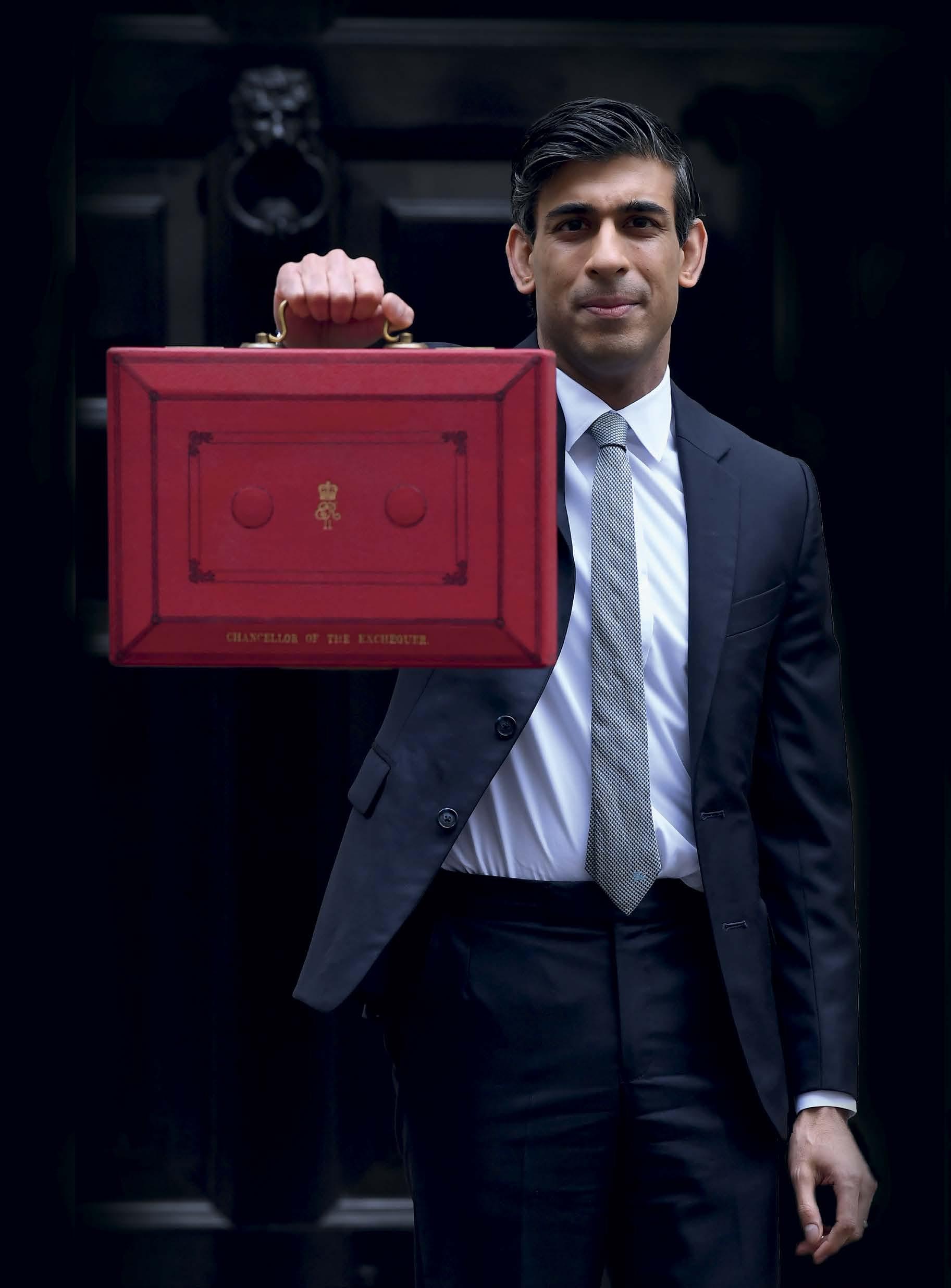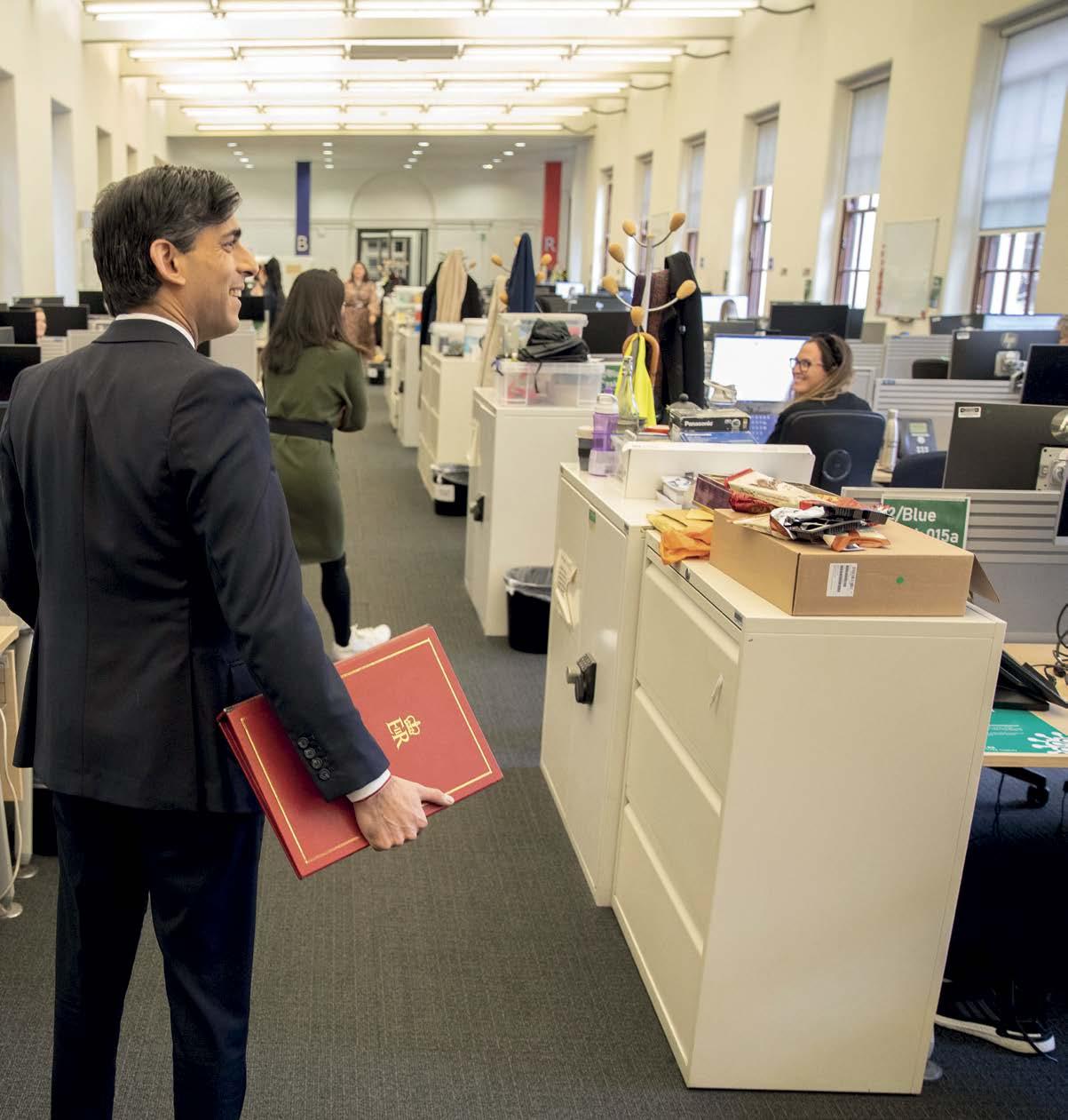
13 minute read
Budget 2021
A guide to the key tax announcements
In a Budget designed to tackle unprecedented issues, Rishi Sunak sets out his plans for the future.
With so many of the Budget changes having been widely floated in advance in the media, much of the interest may be in the things we did not already know about; for example, for companies, the new super-deduction providing allowances of 130%, or else the first year allowance of 50%, on new plant and machinery. Also of interest is the introduction of a new (but long-awaited) points-based penalty regime for tax return filing obligations, which will replace existing penalties for VAT (from April 2022) and income tax self assessment (from April 2023 in most cases).
This is not the end of the story, as we are promised consultation documents on as yet unspecified future tax changes on 23 March. When announcing consultations, the financial secretary indicated that it would contain a range of important but less high profile measures (our italics), so it may possibly not be quite as exciting as some commentators have been suggesting, but significant nevertheless. We shall find out soon enough.
Personal tax Rates and allowances for 2021/22 The personal allowance will increase to £12,570 and the basic rate limit to £37,700 in 2021/22. These levels will continue up to and including 2025/26. The additional rate threshold remains at £150,000. This applies equally across the UK, except that Scotland has its own income tax rate bands set by the Scottish Parliament.
The starting rate for the savings limit will remain at £5,000.
As regards pensions tax, the link to the Consumer Price Index increase for the lifetime allowance has been removed for five years, so the allowance remains at £1,073,100 for 2021/22 to 2025/26. The government will legislate to ensure that collective money purchase pension schemes, which will be introduced by the Pension Schemes Act 2021, can operate as registered pension schemes for tax purposes.
The capital gains tax annual exempt amount will remain at £12,300 up to and including 2025/26.
Inheritance tax thresholds and rates are unchanged and the nil rate band will remain fixed until April 2026.
Income tax exemption for certain financial support payments An exemption from income tax will apply for financial support payments made by the UK government and devolved administrations to potential victims of modern slavery and human trafficking. The exemption will take effect retrospectively from 1 April 2009 when the financial support payments started.
Social Investment Tax Relief Social Investment Tax Relief for both income tax and capital gains tax will be extended until April 2023. Relief for gifts of business assets Entitlement to capital gains tax relief for gifts of business assets is disapplied where a transferee company is controlled by a person who is not resident in the UK and who is connected with the person making the disposal. This anti-avoidance rule will be amended to ensure that it applies when the non-UK resident person gifting the asset also controls the recipient company.
Individual savings accounts and child trustfunds The ISA, junior ISA and child trust fund limits are unchanged for 2021/22.
Employment tax Coronavirus-related measures Home office equipment expenses: Legislation was introduced in 2020 to provide that there is no charge to tax for an amount reimbursed to an employee on or after 11 June 2020 (backdated to 16 March 2020 by concession) and before 6 April 2021 in respect of home office equipment expenses. “Home office equipment expenses” are expenses incurred by the employee in respect
A one-off payment of £500 is being made under a coronavirus support scheme to working households in receipt of tax credits to cover a period from April to September 2021.”
of equipment obtained for the sole purpose of enabling the employee to work from home during the Covid-19 pandemic. There must be no significant private use. The exemption applies equally to NIC. These exemptions will now be extended to cover the 2021/22 tax year.
Employer-provided coronavirus tests:
Legislation is already in place to ensure that the provision of coronavirus antigen tests (but not antibody tests) to employees by employers do not attract tax and NIC for 2020/21. These exemptions will be extended to cover 2021/22 as well.
Employer-reimbursed coronavirus tests:
Finance Bill 2021 will introduce a retrospective income tax exemption for payments that an employer makes to an employee to reimburse them for the cost of a coronavirus antigen test for 2020/21. A corresponding NIC exemption has already been put in place by regulations. A similar exemption will be introduced for 2021/22 for both income tax and NIC.
Enterprise Management Incentives (EMI):
Where employees are furloughed, working reduced hours or taking unpaid leave due to coronavirus, they may not be able to meet the committed working time requirement of EMI. Finance Act 2020 included legislation to ensure that a disqualifying event does not occur purely as a result of any such occurrence. This has effect in relation to the period 19 March 2020 to 5 April 2021 inclusive, but it will now be extended until 5 April 2022. As previously announced, Finance Bill 2021 will legislate to ensure that new EMI options issued to employees who have not met the working time requirement as a result of coronavirus will be qualifying EMI options. This will have effect throughout the period 19 March 2020 to 5 April 2022.
Cycle to Work scheme: Firming up a statement made to Parliament in December 2020, new legislation will introduce a time-limited easement to disapply the condition that states that bicycles and cyclist safety equipment, where obtained through a Cycle to Work scheme, must be used mainly for qualifying journeys (to or from work or in the course of work). Due to lockdown, it will not be possible in many cases for that condition to be met. Employees who joined a Cycle to Work scheme and were provided with a bicycle or cycling equipment on or before 20 December 2020 will not now have to meet the qualifying journeys condition until after 5 April 2022. However, employees who join a scheme on or after 21 December 2020 still need to meet all the conditions for the exemption.
Coronavirus support scheme: working
households receiving tax credits: A one-off support payment of £500 is being made under a coronavirus support scheme to working households in receipt of tax credits. It will cover a six-month period from April to September 2021. Legislation to be included in Finance Bill 2021 will exempt this payment from income tax.
Off payroll working As previously announced, a technical change to the off payroll working rules will apply from 6 April 2021. The change relates to company intermediaries and narrows the definition of an intermediary to bring it back within the intended scope of the policy. It has now been confirmed that an equivalent change will also be made to the relevant NIC regulations ahead of 6 April 2021 and that the government will also introduce a Targeted Anti Avoidance Rule (TAAR) to ensure that the definition of an intermediary cannot be exploited. Two further minor changes will be made relating to the provision of information.

Car and van benefits The amount to which the appropriate percentage is applied in determining the taxable benefit of company car fuel is £24,600 for 2021/22 (£24,500 for 2020/21). The cash equivalent of the benefit of a company van for 2021/22 is £3,500 (£3,490 for 2020/21). The cash equivalent of the benefit of van fuel for 2021/22 is £669 (£666 for 2020/21).
As announced at Budget 2020, the government will legislate in Finance Bill 2021 to reduce the van benefit charge to zero for 2021/22 onwards for vans that produce zero-carbon emissions. Salary sacrifice arrangements and statutory parental bereavement pay The optional remuneration arrangements legislation introduced in 2017 removed the income

©Flickr/HM Treasury
tax and NIC advantages for many employmentrelated benefits provided via salary sacrifice schemes.
In certain cases, the old rules are permitted to continue until 5 April 2021 provided there is no variation in the employee’s employment contract. Backdated legislation will be introduced to ensure that the receipt of statutory parental bereavement pay does not count as a contract variation for this purpose.
❯The Chancellor Rishi Sunak speaks to HMTreasury staff as he makes final preparations for the budget
Business tax Corporation tax rates As widely anticipated, the Chancellor announced an increase in the rate of corporation tax but not for another two years.
For 2021 and 2022, the main rate of corporation tax (for non-ringfenced profits) will remain at 19%. However, from 1 April 2023, this rate will increase to 25% for companies with profits over £250,000. Companies with profits of £50,000 or less will continue to be taxed at 19%. Where profits fall between £50,000 and £250,000, the tax rate will be 25%, but companies will be able to claim marginal relief.
The related 51% group company test will be repealed and replaced by associated company rules. The diverted profits tax rate will also be increased to 31% from 1 April 2023 (currently 25%), maintaining the 6% differential between it and the main rate of corporation tax. Temporary extension to carry back of trading losses The period over which trading losses can be carried back is to be temporarily extended from 12 months to three years. This extension applies for trading losses incurred by companies in accounting periods ending between 1 April 2020 and 31 March 2022 (tax years 2020/21 and 2021/22 for unincorporated businesses). This extended carry back is not without restriction, though. For companies there is no limit on the amount of trading losses that can be carried back to the preceding year, but, after that, a maximum of £2 million of unused losses are available for carry back against profits of the same trade for the earlier two years. This £2 million limit applies to each accounting period falling within 1 April 2020 to 31 March 2022.
For individuals claiming trading loss relief, there is a similar regime. The amount of trading losses that can be carried back to set against profits of the preceding year remains unlimited, and the current restrictions to carry back losses from a trade against general income will remain. There is, however, a separate £2 million cap that will apply to the extended carry back of losses made in each of the tax years 2020/21 and 2021/22.
Capital allowances For companies within the charge to corporation tax, increased allowances for expenditure on plant and machinery will apply temporarily. For qualifying expenditure incurred from 1 April 2021 to 31 March 2023, companies will be able to claim: ● a super-deduction providing a first year allowance of 130% on most new plant and machinery investments that qualify for 18% main rate writing down allowances; and ● a first year allowance of 50% on most new plant and machinery investments that ordinarily qualify for 6% special rate writing down allowances.
The relief will not apply to contracts entered into prior to Budget day on 3 March 2021. The general exclusions in CAA 2001 s 46 will apply, and there will be exclusions for used and second-hand assets. The rate of the super-deduction will require apportioning where expenditure is incurred in an accounting period that straddles 1 April 2023.
Interest or royalty payments to connected companies in the EU From 1 June 2021, interest or royalty payments made from the UK to a connected EU company will no longer automatically be paid without deduction of withholding tax. Instead, the treatment of these payments will be governed solely by the reciprocal obligations under the relevant double tax agreements. The government intends to repeal the UK domestic legislation that gave effect to the EU Interest and Royalties Directive for payments made on or after 1 June 2021. This measure ensures that EU companies no longer receive any more favourable treatment than companies based elsewhere in the world.

©Flickr/HM Treasury
Freeports The Budget included an announcement on the location of eight English freeports. Once tax sites within these freeports have been designated, businesses in those tax sites will be able to benefit from a number of tax reliefs. These include: ● an enhanced rate of structures and buildings allowance of 10%, which will have effect for qualifying expenditure where the first contract for construction of the relevant structure or building is entered into on or after the date the freeport tax site is designated. To qualify, the structure or building must be brought into use on or before 30 September 2026; ● a 100% enhanced capital allowance, which will be available for expenditure on plant and machinery incurred on or after the date the freeport tax site is designated until 30 September 2026; and ● stamp duty land tax relief for purchases of land or property, subject to that land or property being acquired and used for qualifying purposes and subject to a control period of up to three years. It will apply to qualifying transactions with an effective date from the date the freeport tax sites are designated until 30 September 2026.
Self-employment income support scheme (SEISS) payments Eligibility for the fourth grant will be based on the claimant’s submitted tax return for 2019/20, which must have been submitted by 2 March 2021.
Under current legislation, a SEISS payment is taxed as income for 2020/21. Legislation will be introduced to ensure that payments from the SEISS are taxed as income for the tax year in which they are received. A SEISS payment that an individual claims but to which they are not at that time entitled can be recovered by a tax charge. 14
❯The Chancellor Rishi Sunak speaks by phone to United States Secretary of the Treasury Janet Yellen from his office in Downing Street.
A further measure will be introduced that enables HMRC to recover payments where an individual was entitled to the payment at the time of claim but subsequently ceases to be entitled to all or part of it.
Class 4 national insurance limits The Class 4 upper profits limit will increase to £50,270 in 2021/22 and remain at this level up to and including 2025/26. The lower profit limit is increased to £9,568.
VAT and indirect taxes VAT registration/deregistration thresholds The current VAT thresholds for registration and deregistration (£85,000 and £83,000 respectively) will be maintained until 31 March 2024.
Reduced rate for the hospitality industry extended The reduced rate of 5%, which currently applies to certain supplies relating to hospitality, hotel and holiday accommodation and admission to certain attractions, will be extended until 30 September 2021. A new reduced rate of 12.5% will then apply until 31 March 2022, after which the standard rate will apply. Regulation 55K of the VAT Regulations will be amended to ensure that businesses using the flat rate scheme will also benefit.
New payment scheme in respect of deferred VAT Due to coronavirus, businesses were allowed to defer VAT liabilities falling due between 20 March 2020 and 30 June 2020 until 31 March 2021. It was subsequently announced (on 24 September 2020) that businesses would be able to pay that deferred VAT in up to 11 monthly interest-free instalments. This measure will be legislated for in Finance Act 2021. The legislation will also provide for a penalty of 5% of the outstanding VAT if a business has not, by 30 June 2021: ● paid its liability under the deferral scheme in full; ● opted into the in new payment scheme; or ● made alternative arrangements to pay by 30 June 2021.
The application of the penalty will be at the discretion of HMRC. It will apply instead of the normal default surcharge regime.
Stamp duty land tax The temporary increase in the stamp duty land tax nil rate band for residential property in England and Northern Ireland that was due to end on 31 March 2021 will be extended. The nil rate band will continue to be £500,000 for the period 8 July 2020 to 30 June 2021. From 1 July 2021 until 30 September 2021, it will be £250,000, and it will return to the standard amount of £125,000 from 1 October 2021.










